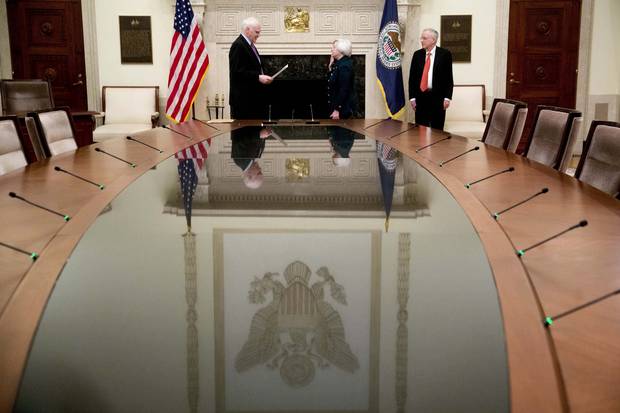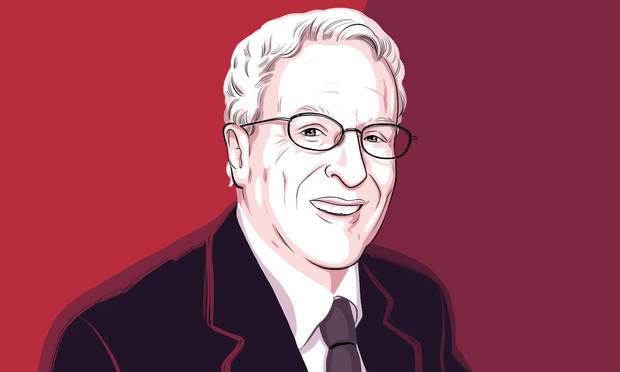George Akerlof is a Nobel Prize-winning economist, prolific writer and celebrated Georgetown University academic.
He's also "Mr. Yellen" – the long-time husband of U.S. Federal Reserve Board chair Janet Yellen, one of the most powerful women in the world.
"Mr. Yellen? I answer to that, yes," Mr. Akerlof, 75, acknowledges with a grin.
It's not always easy being Ms. Yellen's husband. Mr. Akerlof's work often strays from economics into political theory and public policy – a touchy subject in a highly partisan Washington. His latest book, the 2015 Phishing for Phools: The Economics of Manipulation and Deception (co-written with Robert Shiller, who is also a Nobel Prize winner), argues forcefully that governments must act to protect people from the irrationality of the free-market economy, and themselves, in areas such as the marketing of prescription drugs, alcohol, financial services and even politicians. He's a staunch advocate of a selectively muscular role for government – to police financial markets and regulate the flow of money into politics – views that put him at odds with much of the Republican-held Congress.
Mr. Akerlof is constantly mindful that what he says, and writes, risks making life awkward for his wife, who's under the constant scrutiny of Congress, global financial markets and the media. And he quickly sidesteps a question about Republican presidential front-runner Donald Trump. "Let me not mention his name," Mr. Akerlof says during a recent stopover in Ottawa.
He's learned to adapt to a life as "Mr. Yellen" – more or less. It's been more than two decades since Ms. Yellen first went to work at the Fed, and more than two years since she became Fed chair.
"My life hasn't changed very much," he insists, sitting in a plush armchair in a quiet corner of the lobby of Ottawa's Chateau Laurier hotel. "The reception to my work is very much independent to the fact that my wife is chair of the Fed … [But] I try to be careful."
In 2014, for example, Mr. Akerlof resigned his unpaid seat on the board of a think tank funded by German bank UBS AG to appease critics and avoid "even the appearance" of a conflict of interest, where there was none. "That was ridiculous," he says now of the episode.

Janet Yellen, chair of the U.S. Federal Reserve, takes the oath of office in 2014. Her husband, George Akerlof, right, looks on.
Andrew Harrer/Bloomberg
Both he and his wife enjoyed long and distinguished careers as economists – long before Ms. Yellen got the top job at the Fed. Ms. Yellen and Mr. Akerlof first met in the 1970s in the Federal Reserve cafeteria, when they wound up sitting together at the "overflow table" listening to a guest speaker. Mr. Akerlof was a visiting scholar; Ms. Yellen was in the international section, and the relationship began. They've spent the bulk of their working lives teaching together, first at the London School of Economics and for a much longer period at the University of California, Berkeley, where Mr. Akerlof remains professor emeritus. The couple moved to Washington in 2010 when Ms. Yellen was named vice-chair of the Fed under Ben Bernanke.
They both lead busy, frenetic lives, with frequent travel. But they find time to share quiet dinners at their home in the elegant enclave of Georgetown. "We listen to each other, with tea and sympathy," he says of these moments.
What was planned as a late-breakfast interview in Ottawa with Mr. Akerlof turns into a no-food, no-tea meeting in the lobby because the hotel's Zoe's Lounge is closed. Mr. Akerlof dresses the part of the academic, looking slightly rumpled in a checked shirt and a cardigan. At times, he sits with one leg draped, swinging, over the arm of a chair.
He talks deliberately, with frequent pauses, before launching into lengthy and complex, thesis-like responses, complete with numbered points and examples.
Mr. Akerlof has a quirky sense of humour. He's fond of inventing words, such as "phools," used in the title of his latest book. And he laments the "economicky" way his profession sometimes makes faulty assumptions about human behaviour ("I don't know whether you spell that with a 'k' or not," he jokes).
Phishing for Phools, is part of Mr. Akerlof's groundbreaking thinking on "identity economics" – how people's sense of who they are is often more important than financial incentives in their decision making. He won a Nobel Prize in 2001, along with Michael Spence and Joseph Stiglitz, for his analysis of how markets malfunction when sellers have better information than buyers, using the market for "lemon" used cars as an example.
"George is very open to ideas from sociology, psychology, and anthropology," explains Université de Québec a Montréal economist Pierre Fortin, a long-time friend and colleague. "This is the reason why identity economics was born."
Mr. Akerlof's early life offers clues to why he's so fascinated with the interplay between economics and other disciplines such as psychology. When he was 11, his father lost his job as a research chemist at Princeton. The ensuing family crisis left a deep impression on the young Akerlof, sparking an enduring interest in unemployment, and on human problems, more broadly. Later, as a young economist, Mr. Akerlof spent a year in India in the late 1960s studying the optimal distribution of water from a dam in northern Punjab, but also learning how the caste system creates distortions in wages and joblessness.
"This then might be the springboard to answering one of the most important questions in economics – why there is so much unemployment," Mr. Akerlof says of his experience in India. "From that time on, I have taken an avid interest in sociology, anthropology, and also psychology."
One of the fundamental messages of Mr. Akerlof's work is that free markets are great, but they're also flawed and prone to deception and abuse, according to Mr. Fortin.
Some critics have complained that the main thesis of Phishing for Phools is oversimplistic – namely, that capitalist pressures breed unscrupulous behaviour. The Economist magazine, for example, called some of the authors' key arguments "crushingly familiar." And a Wall Street Journal writer complained that embracing the book's conclusions about flawed markets would lead to "overreaching" regulation. Mr. Akerlof prefers the reviews by other economists, who he says grasped the book's deeper message.
Mr. Akerlof isn't too worried about the reaction to the book, particularly from conservatives. The book, he says, was intentionally written on different levels –"like a [William] Faulkner novel" – and many people just didn't get it. "It's a very sophisticated book, and you need a huge amount of economic knowledge and political theory to get that out," Mr. Akerlof says.
The fact that some people apparently didn't get his message about the link between economics and the role of government and public policy doesn't bother him.
"I don't see this as a frustration. I see this as a challenge," he says. "I've done this my whole life. You dip your toe in the water, you see what happens and you react."
It isn't so much that Mr. Akerlof wants more government. The goal, he says, is a more pragmatic approach to government, based on how people interact socially and behave inconsistently.
Mr. Akerlof is constantly challenging the foundations of conventional supply-and-demand economics.
"Economics is like a game of chess. You think out your moves in advance and have totally consistent behaviour," he explains. "Our lives are not like that …. The fact that our decisions are inconsistent is not at the heart of economics, and that changes the whole ball game."
Mr. Akerlof offers an example of why this matters. A fictional couple – Tim and Sue – are at the grocery store. Conventional economics suggests their purchases will be driven by a desire to maximize their happiness, while factoring in the money they have to spend. Instead, at least half the population overspends on some things and ends up without enough money by the time they reach the dairy aisle, or at the end of the month, to maintain a healthy diet.
"People are making wrong decisions that seriously affect their lives," he laments. "To get economics right we need to have people's motivations right. In order to do that we have to know what people are thinking."
The phenomenon, according to Mr. Akerlof, proves that societies need government intervention in areas where irrational and inconsistent behaviour leads to poor decision making. Governments, for example, force workers to save – through programs such as the Canada Pension Plan or U.S. Social Security – to ensure they have income in retirement.
"Instead of saying interference by the government anywhere and everywhere is bad, we have to say, yeah, we have a pragmatic program that works," he adds. "My idea about public policy is that you take what you have, be very conservative about what you add. But then you look around and see where additions can be helpful, and where that is going to relieve very serious problems."
There is a tinge of intellectual arrogance to Mr. Akerlof – and not just in the way he dismisses critics who don't "get" the book. He seems more focused on preaching to those in his own profession – the dismal science – than the broader public. Within 25 years, he predicts that economists will have embraced a more "social" view of the world, and incorporate that into their models.
"The way that [Mr. Shiller and I] are looking at things is just correct and undeniable," he says. "What could be debatable is whether [the effect] is big versus small."
Mr. Akerlof is already hard at work on another book, which explores ways to improve the field of economics. Economists, he says, must do a much better job of "putting ourselves in people's minds" as they make decisions.
"This is the next step forward. You are talking to a happy camper," he tells me. "I'm going to find this a good deal of fun."
